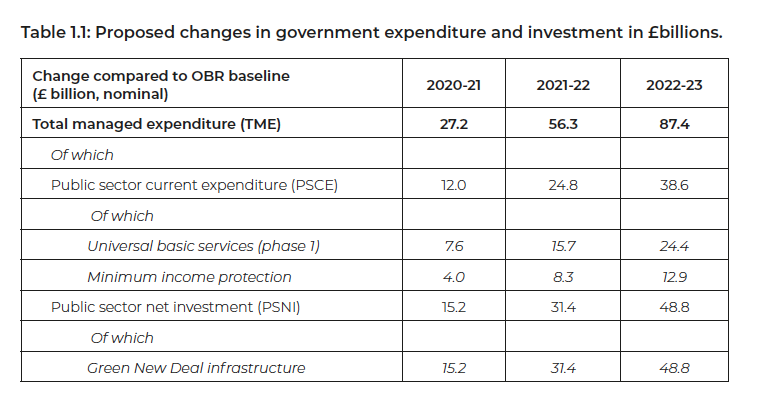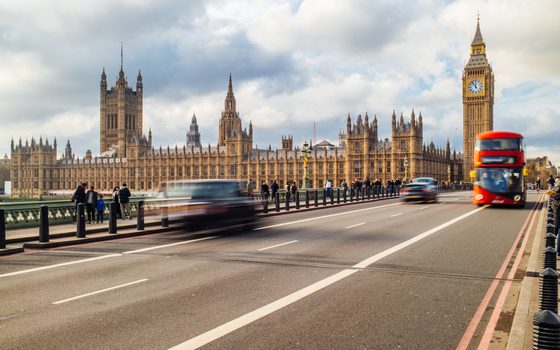Build 3m social homes, spend 2% of GDP to fight climate crisis & invest £75bn in minimum income protection and UBS to kick-start economic transformation
New Economics Foundation calls on all parties to set out ambitious agenda in this election to fix the UK’s broken economy
11 November 2019
The next government should build 3 million new social homes, spend 2% of GDP to fight the climate crisis and invest £75 billion to offer minimum income protection and universal basic services — among other measures — to start transforming the UK economy, according to a new package of policies published today from the New Economics Foundation (NEF).
The report sets out a vision for a new economy that tackles economic, ecological and democratic problems. It includes a plan to provide a decent safety net and provide a high level of care for everyone throughout their lives. It calls for huge investment in a new generation of jobs in the industries and infrastructures needed to tackle the climate crisis. And it outlines the ways devolution of state power and a transformation of ownership in the workplace can start to transform the economy and give people more of a voice.
The package of policies — a set of new rules to transform the UK economy — would protect the planet, improve living standards, and give people a voice. The policies include:
- A Green New Deal: 2% of GDP should be set aside for a Green New Deal to decarbonise at pace whilst lifting living standards, with half devolved to regional authorities.
- Better housing: £10 – 12 billion a year ear-marked to build 3.1 million social homes over 20 years and new devolved powers to introduce rent controls to deflate rents.
- Minimum income protection: The personal income tax allowance should be scrapped for a weekly payment of £48 to all adults and Universal Credit replaced with a new system of minimum income protection.
- Universal basic services: Extend universal basic services from health and education to social care, childcare and public transport. Beginning by increasing UK spending on public services by one percentage point – around £24 billion – bringing it into line with the rest of the EU.
The report argues that the UK is in the grip of economic, environmental and democratic crises, and that the struggle over Brexit is a symptom of a deeper economic problem. NEF analysis has found that people in the UK are, on average, £128 poorer today than they were in 2008. The UK is beginning to face the impacts of the climate crisis, and residents have been left out of decisions about how the economy is run. NEF has set out some immediate actions for the next government to take to transform the UK economy.
Other policies from the report include:
- Automatic union recognition: All employers with over 50 workers and self-employed and outsourced workers should also have access to union-associated rights.
- Inclusive Ownership Funds: All companies over a certain size should gradually transfer up to 10% of their ownership rights into Inclusive Ownership Funds controlled by the company’s workforce. Workers would have a say in the running of the company and receive a capped annual dividend, with the rest going to regional funds to support small and medium enterprises.
- A shorter working week: The UK should boost its productivity through a shorter working week. A Working Time Commission would recommend annual increases in paid holiday in response to gains in the economy.
Miatta Fahnbulleh, Chief Executive of the New Economics Foundation, said:
“The UK is in the grip of three interlinked crises: a crisis of living standards, an ecological crisis and a democratic crisis. But at the moment when we should be tackling these crises, we are locked in a seemingly unending battle over Brexit. We need a transformative political programme that mobilises people and maps a new role for the state. And so we are calling on all political parties to set out an ambitious agenda in this election to fix the UK’s broken economy.”
“At NEF we propose three missions for a new economy: a new social settlement to improve quality of life, a Green New Deal to reach net-zero emissions while reducing inequality, and the creation of a democratic economy to give people a voice in their local places and workplaces.”
Contact
Sofie Jenkinson, sofie.jenkinson@neweconomics.org, 07981023031
Notes to editors
The pamphlet, Change the Rules: New Rules for the Economy is available at: https://neweconomics.org/2019/11/new-rules-for-the-economy.
The New Economics Foundation is a charitable think tank. We are wholly independent of political parties and committed to being transparent about how we are funded.
For those proposals that require a significant increase in either government day-to-day spending (public sector current expenditure – PSCE) or capital investment (public sector net investment – PSNI), we have included brief discussions of the fiscal implications in our narrative above. The estimated effects of these proposals relative to the OBR’s core forecast for government’s total managed expenditure (TME) are summarised over a three-year time horizon in the tables below. Table 1.1 sets out the change in fiscal position in cash terms and table 1.2 presents the same figures as a percentage of GDP. All changes presented in the tables are net of any reductions in public spending implied by our prospectus – such as pertaining to HS2 and Heathrow airport expansion – since we assume the funds saved from these projects should be cycled into greener, and more just, public infrastructure investment on top of the commitments set out below.
Table 1.3 also lists potential sources of additional government revenue that could be used to reduce reliance on borrowing to fund public investment, services and cash transfers. However, we propose that borrowing is deliberately expanded in a responsible way and in line with new fiscal rules that target the most effective use of so called ‘fiscal space’ (see above sections on a New Social Settlement and a Green New Deal) – and with respect to the three crises we have identified. In particular, higher public borrowing should be used to frontload and accelerate investment in zero carbon infrastructure in a way that also helps to rebalance the economy.

Campaigns Homes For Us
Topics Climate change Environment Health & social care Macroeconomics Public services






